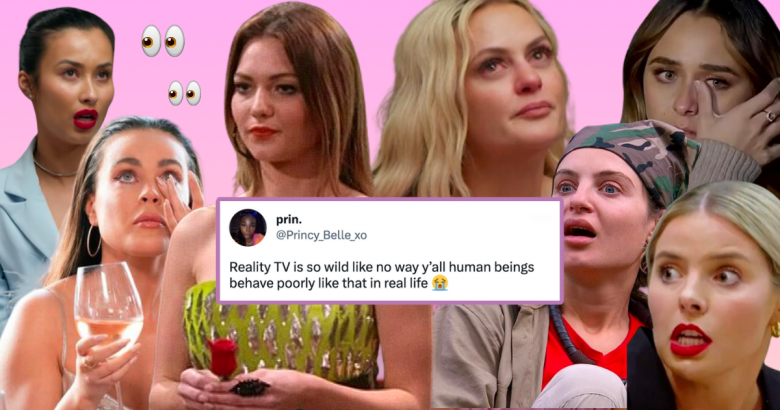
I Worked In Reality TV: Here Are 5 Secrets I’m Definitely Not Meant To Share
At the end of every Married at First Sight season there are always contestants who slam their edit, but just how true are these claims? Sure, everything they say has to come out of their mouth… but it’s not that simple.
When I stumbled onto my first reality TV gig in my 20s, I naively thought that producers had a more observational role, and that the contestants created all the drama organically. I quickly learned that filming someone for hours baking, renovating, or shopping, was really, really boring – which is why there’s nothing ‘real’ about reality TV.
Here are five secrets that may surprise you about working in reality TV.
1. You learn how to make contestants cry.
I was taken aback when a high-profile producer motioned to me on the set of a competition show. “Come here Rach, I’ve been asked to make this contestant cry. I’ll show you how easy it is,” she said.
As a meek and lowly production assistant, I followed her into the interview room to watch the ‘magic’ happen. After hitting the contestant with some personal questions, the producer paused, tilted her head and plastered on a sympathetic face. “That must be really hard for you,” she said, before leaving an uncomfortable amount of silence. Cue waterworks.
I had a front-row seat to a masterclass in creating reality TV gold. And sadly, I did end up using these very tactics (which I feel bad about now) to cause another contestant to cry on camera later in my career.

Image Source: Channel 9, MAFS
2. Producers use contestants to get what they want.
Part of my training as a story producer was to get close to the contestants and make them feel like you’re their best friends. It’s pretty icky when I think about it now, but you basically lull participants into a false sense of security… and then use their flaws and secrets against them.
It’s human nature to want to be liked, so it’s not hard for producers to create a friendly atmosphere and what contestants think is a *safe space* (spoiler: it’s usually not). Also, after filming for hours on end – just like on dinner party nights on MAFS which reportedly go on until the next morning – can you really fault a contestant for snapping and just wanting to sleep?!
3. Storylines can be crafted.
Let’s be honest, if we had a completely unscripted stream of contestants on reality shows without any external forces, it would be a total snoozefest.
Producers pick out storylines during filming and keep note of what’s needed to wrap it up nicely. When it comes to the edit, nothing is off-limits. Use an interview grab completely out of context? Done. Join two separate statements together in a rough frankengrab? Done.
Interviews are often transcribed before the editors start, making it easy to find a particular word or phrase to fit the narrative. In the past, I’ve scrubbed through hours of footage to find the missing piece to finish an episode.

Image Source: Channel 10, The Bachelor
4. Pressure can be used to motivate contestants.
Producers plan out high-pressure situations to ramp up the drama onscreen. These plans can be spotted quite easily once you’re looking out for them. But surely you’ve had some questions about your fave Aussie reality TV shows?
Like… do The Block contestants really need to live in a muddy dump during the start of the show? Is there a reason they’re so sleep-deprived? And when you really think about it, how on earth would a MAFS dinner party contribute to a ~healthy~ relationship?
I’ve also seen producers put doubt into contestants’ heads over what their fellow competitors are doing, impacting their decisions going forward. Let me break down an example.
Say contestants have to rank each other’s work out of 10 (think Come Dine With Me). Nobody wants to look like a selfish jerk on TV, so who would settle on low scores? But maybe, just maybe, one of the contestants was told by a producer that other contestants were thinking about dropping ones and twos on their scoreboards, making them feel comfortable that the three they want to give is actually really generous.
And, of course, they don’t find out the actual reality until it’s too late.

Image Source: Channel 10, The Bachelor
5. There’s always someone listening.
One of the story producers on a show I was working with got in trouble because he taught contestants how to tap on their mic when they wanted to speak privately. That way the audio was muffled and unusable for the show.
I have never been more serious when I say that producers don’t want anybody to learn this trick. Ever.
Reality TV participants naturally let their guard down when they’re off-camera, and some of the spiciest content can come from these moments. It’s a rookie mistake, as the soundies hiding in the bushes are always listening. Simply play the audio over a shot of the building, and voilà, we have incriminating evidence.
Even if the audio isn’t used, it gives producers more intel into what contestants are really thinking… and of course, that information can be used against them (are you starting to see a common pattern?).
The takeaway from these industry secrets is there’s not reeeally anything ‘real’ about reality TV. Is that going to stop me from consuming an insane unhealthy amount of it? Absolutely not.
Image credits: Channel 9, MAFS, Channel 10, The Bachelor
